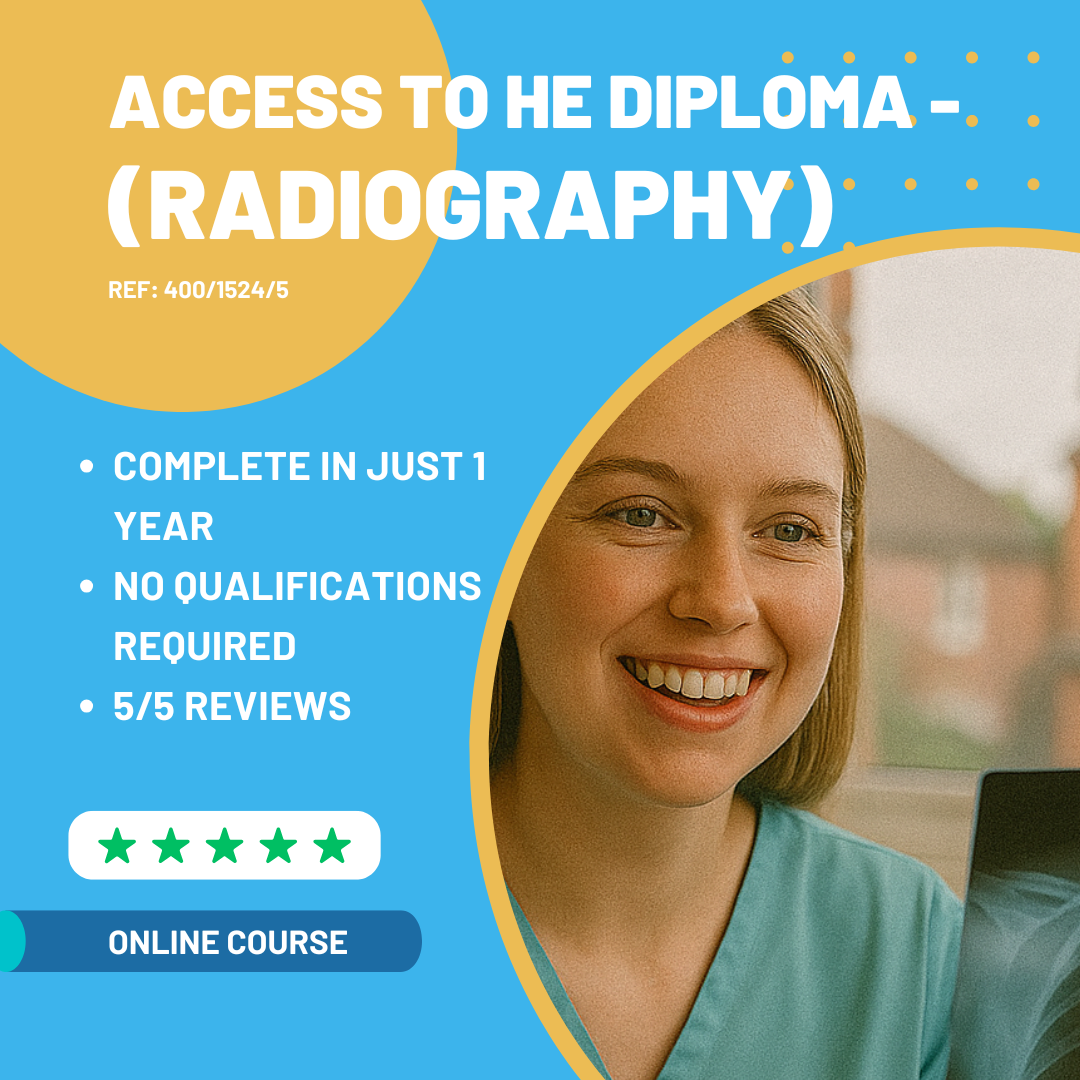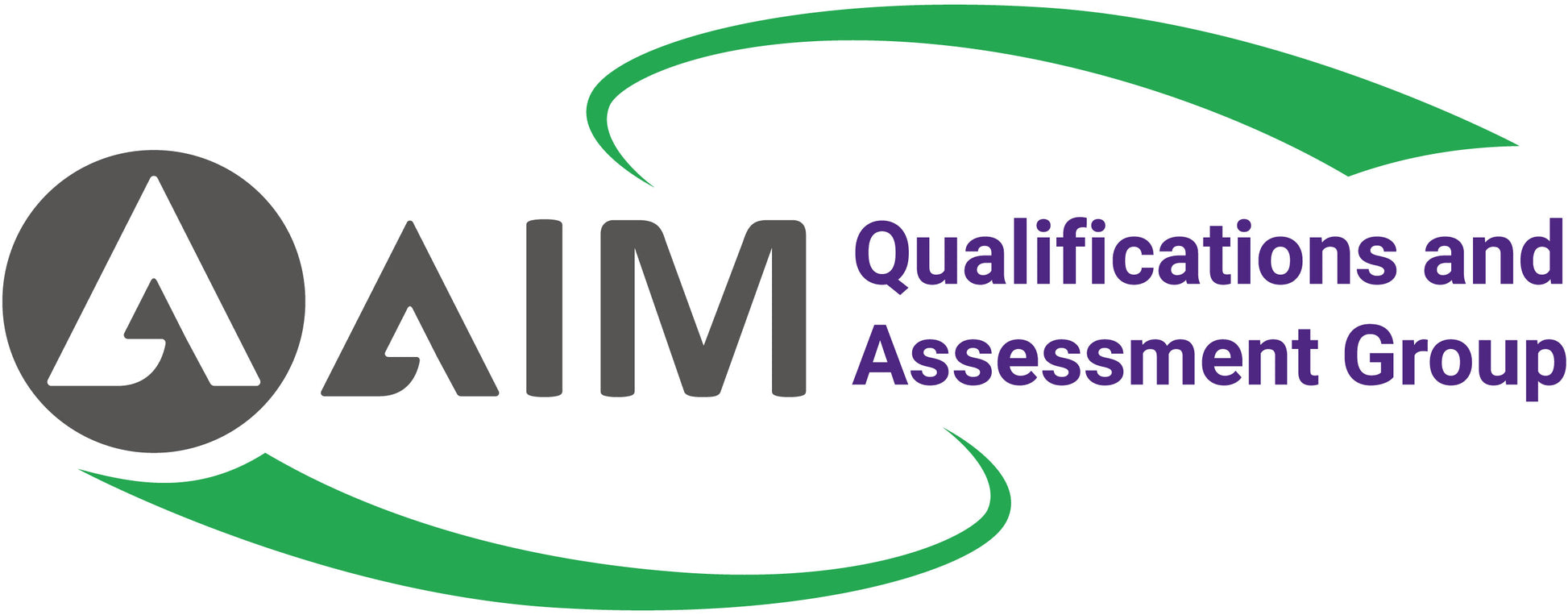AccessCoursesOnline
Access to HE Diploma (Radiography)
Access to HE Diploma (Radiography)
Couldn't load pickup availability
Course Outline
Course Outline
The Access to HE Diploma (Radiography) is a full Level 3 qualification awarded by AIM Qualifications and Assessment Group and accepted by universities across the UK.
The diploma combines:
Biology units that explain how the human body functions and how diseases affect health.
Physics units that introduce the scientific principles underpinning radiography and medical imaging.
Health studies units that place radiography within the wider context of the NHS and healthcare.
Study skills units that prepare you for the demands of degree-level learning.
By the end of the diploma, you’ll be ready to progress into university study and take the first step toward becoming a qualified radiographer.
Modules
Modules
Academic Study Techniques (6 credits)
Develop essential academic skills such as essay writing, referencing, note-taking, and independent learning. This unit equips you with the confidence to meet the demands of university study.Preparing for a Higher Education Admission Interview (3 credits)
Prepare for your UCAS application and university interviews. You’ll learn how to present your skills, answer questions effectively, and demonstrate your suitability for radiography courses.Numeracy in a Health Context (3 credits)
Strengthen your maths skills in healthcare-related areas such as measurements, data interpretation, and dosage calculations — all essential for radiography and healthcare professions.Professional Behaviours in Nursing and Health Professions (3 credits)
Explore the personal and professional behaviours expected in healthcare. This unit covers teamwork, communication, confidentiality, accountability, and ethical practice in patient care.Human Cell Biology (3 credits)
Study the structure and function of human cells, including organelles, tissues, and cellular processes. Gain an understanding of how cells contribute to health and disease.Homeostasis and the Endocrine System (3 credits)
Learn how the body maintains balance through homeostasis. Topics include hormones, endocrine glands, and their role in regulating processes such as metabolism, growth, and reproduction.Nutrition & Digestion (3 credits)
Examine how the digestive system processes food and supplies nutrients. Understand how nutrition supports health and how poor diet contributes to disease.The Nervous System (3 credits)
Explore the structure and function of the nervous system, including the brain, spinal cord, and nerves. Learn how it controls body processes and responds to stimuli.Respiration & Circulation (3 credits)
Understand how the respiratory and circulatory systems work together to transport oxygen and nutrients. This unit provides insight into the vital systems often imaged in diagnostic radiography.The Human Skeletal and Muscular Systems (3 credits)
Study bones, joints, and muscles, focusing on their structure, function, and movement. Knowledge of these systems is essential for radiographers when positioning patients and interpreting images.The Urinary System (3 credits)
Examine the structure and function of the kidneys, bladder, and urinary tract. Learn how the urinary system contributes to homeostasis and waste removal.Human Disease & Prevention (3 credits)
Study common diseases, their causes, symptoms, and methods of prevention. Topics include infections, chronic illness, and public health approaches to improving health outcomes.Radioactivity (3 credits)
Learn about the principles of radioactivity, including atomic structure, isotopes, and types of radiation. Understand the applications of radiation in healthcare and the importance of safety.Medical Physics (3 credits)
Explore the physics behind diagnostic imaging and radiotherapy. Topics include X-rays, ultrasound, CT, MRI, and radiation therapy, providing the scientific context for radiography practice.Further Physics for Healthcare Professions (3 credits)
Extend your understanding of physics with concepts relevant to healthcare. Topics may include electricity, waves, and instrumentation used in medical imaging and treatment.Health Promotion (6 credits)
Examine strategies to encourage healthier lifestyles and reduce disease risk. You’ll consider campaigns, education, and interventions used in public health.The Structure & Organisation of the Health and Social Care Sectors (3 credits)
Understand how healthcare services are delivered and managed in the UK. Explore the role of the NHS and other providers in radiography and healthcare careers.The History of the National Health Service (3 credits)
Learn how the NHS was established and how it has evolved over time. This unit places your future role in radiography within the context of the UK healthcare system.
Enrolment Requirements
Enrolment Requirements
There are no formal entry requirements. However, learners are normally expected to be working at:
Level 2 in English
Level 2 in Mathematics
At Access Courses Online, we provide advice and support before enrolment to ensure you are prepared and motivated to succeed.
Assessments
Assessments
Assessment is coursework-based rather than exam-based. Assignments may include:
Essays and reports
Research projects
Case studies
Presentations
Reflective writing
To achieve the diploma you must complete 60 credits:
45 graded credits at Level 3 (graded Pass, Merit, or Distinction).
15 ungraded credits at Level 2 or 3.
Your work is internally assessed and externally moderated by AIM to ensure standards are fair and consistent.
Qualification
Qualification
On successful completion you will receive the QAA-recognised Access to Higher Education Diploma (Radiography), Level 3 (OFQUAL Ref: 400/1542/7).
This qualification is awarded by AIM Qualifications and Assessment Group, regulated by Ofqual, the QAA, and Qualifications Wales.
It is accepted by universities across the UK as an entry qualification for radiography and other healthcare-related degrees.
Careers
Careers
This diploma prepares you for progression to university courses such as:
Diagnostic Radiography
Therapeutic Radiography
Medical Imaging
Healthcare Science
Allied Health Professions
With a degree, you could pursue careers such as:
- Diagnostic Radiographer – performing imaging procedures (X-ray, MRI, CT, ultrasound) to diagnose conditions.
- Therapeutic Radiographer – planning and delivering radiotherapy treatment for cancer patients.
- Medical Imaging Specialist – working with advanced imaging technologies and contributing to research.
- Healthcare Scientist – applying physics and technology to healthcare challenges.
- NHS Leadership Roles – managing radiography teams or healthcare services.
Radiography is a fast-moving field at the heart of modern medicine, offering excellent career prospects and opportunities to make a real difference in patient care.
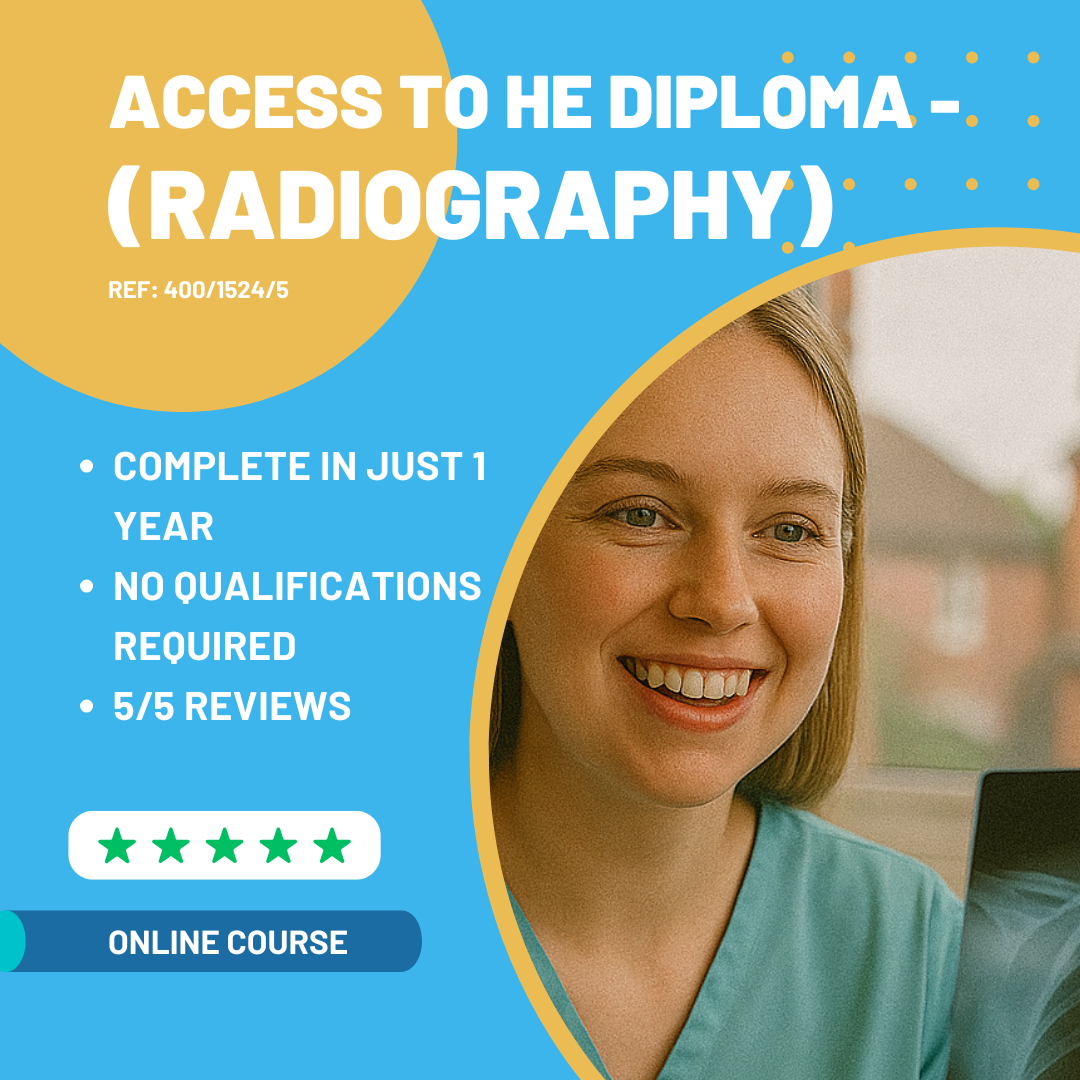
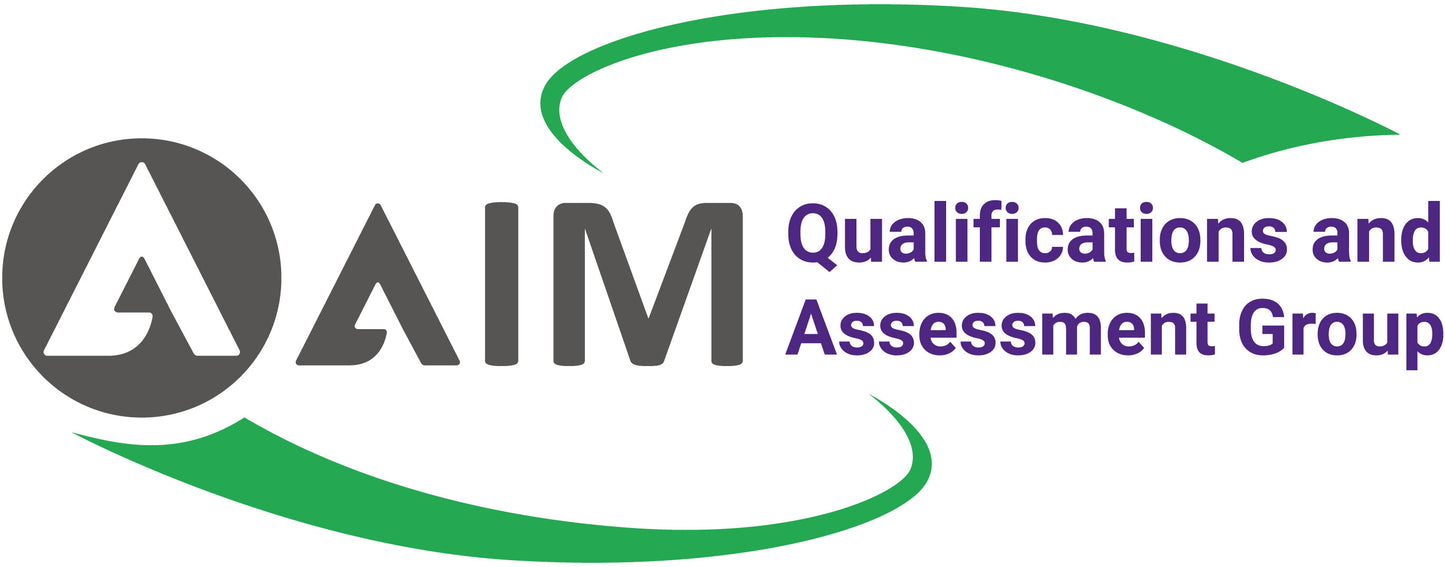

Our Guarantees
-

Affordable Learning
We offer flexible payment plans to make learning more accessible and affordable. Spread the cost of your course over manageable monthly payments, so you can focus on achieving your goals without financial stress.
-
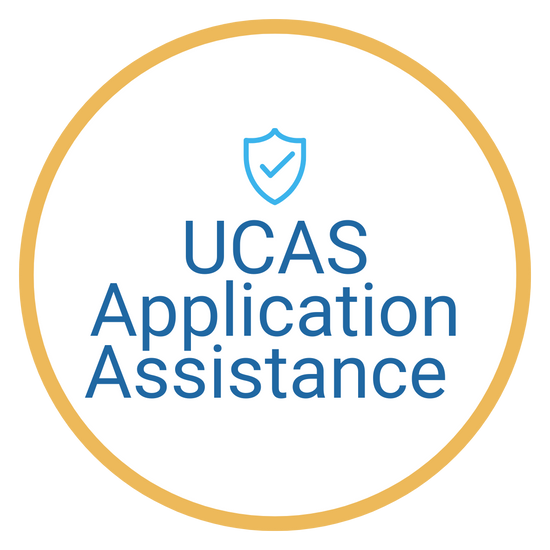
Application Support
We provide UCAS application support to help you navigate the university admissions process with confidence. From personal statement guidance to application tips, we’re here to support your journey to higher education.
-
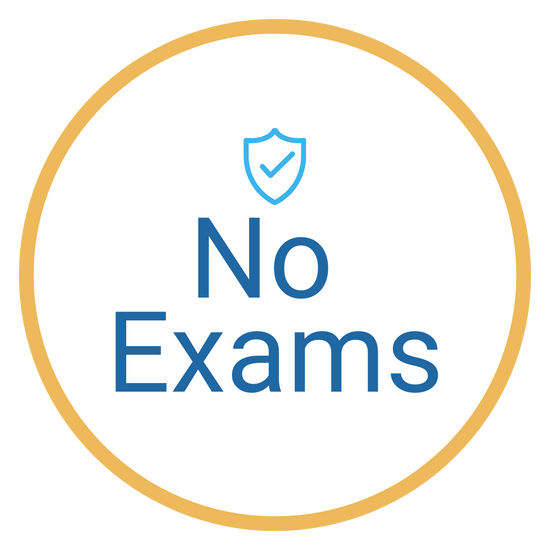
Exam Free Learning
Our courses are completely exam free. Instead of exams, you'll complete assignments and coursework designed to develop your knowledge and skills in a supportive and flexible learning environment.
Meet your expert friendly tutor
FAQs
Radiography
Can an Access to Higher Education Diploma help me become a radiographer?
Yes — an Access to Higher Education (Access HE) Diploma is a valid route into radiography degree courses, especially when, like ours, it is science-based and health-related.
What are the entry requirements for radiography courses in the UK?
Most UK universities accept an Access to Higher Education Diploma in Science or Health-related subjects (including Access to Radiography) as an alternative to A-Levels. To meet entry requirements, you’ll usually need:
· A full Level 3 Access to HE Diploma with 60 credits (45 at Level 3 graded, 15 ungraded).
· Many universities ask for a mix of Merits and Distinctions in relevant science units (biology, physics, or health science).
· GCSEs (or equivalent) in English and Maths at grade C/4 or above are almost always required. Look at our functional skills courses if you need these qualifications. Some universities may also require a GCSE Science.
Because requirements vary, it’s important to check with your chosen university before applying. An Access Diploma provides the academic foundation, but universities may set specific grade profiles or ask for additional experience. Get in touch and we can help with this.
Tutoring
Who will be my Tutor?
We have professionals that are current in their practice of their chosen fields to support you. For example, you will be able to take directly to a Midwife/Nurse and get guidance and support directly from these professionals as you complete your course.
This is on top of a Faculty Leader in Science who has worked as a Science Teacher for more than 10 years.
Will I get some 1:1 support?
Yes! We help our students personally navigate their career options with online video calls and messenger chats.
We provide 1-1 specialist support to you when you need it.
Working in partnership with you, we will provide a personal service of meeting individual educational needs and career options.
Experience
Do I need to be ‘good’ at science?
You experience of science at school will likely be in an exam-based system that places high importance on being able to remember knowledge and ‘perform’ under exam conditions. This course is completely different, instead of covering vast discipline of science this course focussing on the key foundation knowledge that you’ll need in the next step of your learning journey. Teaching difficult concepts is our expertise, we will meet you where you are and get you where you need to be. By the end of the course, you’ll love science and have produced some useful learning resources to take you into your next stages of study.
I’m anxious about sitting exams, will I have to sit exams either face-to-face or online?
This course is completely online, and you’ll be glad to hear that there are no exams. The course leader will assess your understanding and knowledge of the subject but setting you assessments with clear criteria and assessment descriptors. You will submit your assignment for grading, either ‘pass’, ‘merit’ or ‘distinction’.
I’m nervous to present or talk to the group online, will I be forced to do this?
We will meet you where you are, if you want to develop this skill ready for university then we can arrange smaller group sessions or one-to-one sessions to support you, or you can choose an alternative format for your presentation. We want you to feel comfortable and supported on this course.
University
Will I have support applying for university?
Absolutely, we will hold your hand every step of the way, you can talk to us about course choices, we’ll help proofread your personal statement, provide references. As promised, we will get you to university.
I haven’t decided which exact route I’d like to take within the profession, does it matter?
No, not at all, we’ll introduce you to a number of different professionals within the health services so you can hear about their journey, experience and careers.
Lessons
Will I have to do practical experiments at home?
The investigation skills unit is based around a practical investigation of red peppers. The equipment that you’ll need is limited to things you’d find in your kitchen but you don’t need to carry out the investigation yourself if you don’t want to as your course leader will demonstrate it.
What are the assignments like?
We set a variety of assignments that will set you up with skills that will be useful in your future studying and career. We encourage essay writing with referencing, but don’t worry, we’ll show you how! We also set presentations, video tasks, leaflet and poster design and we show you how to use great free tools like Canva to make it super easy.
Do I have to attend live lessons and switch my camera on?
No, not at all. Many of our students are busy people working shifts and managing several commitments. You can watch the session recordings and then arrange a time to meet with your tutor to ask any questions or get further support. As for the camera, switch it on if you feel comfortable, don’t worry if not. We’ve created a culture of supportive and collaborative students in our online community, but all approaches are respected and accepted. Do what makes you feel comfortable.

